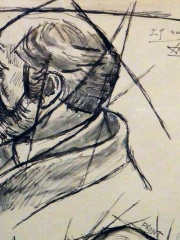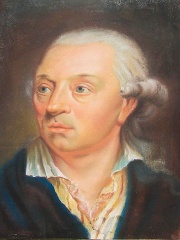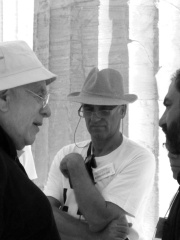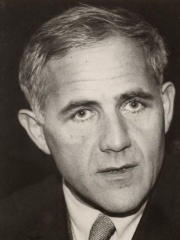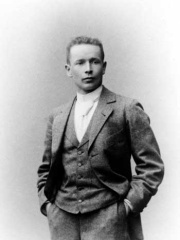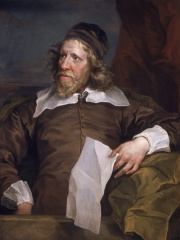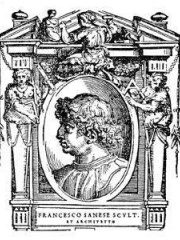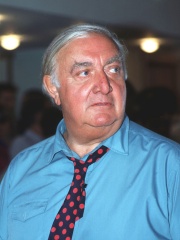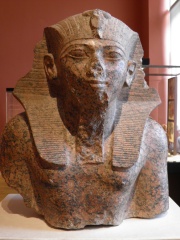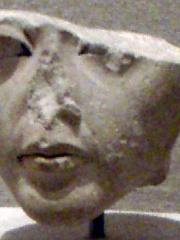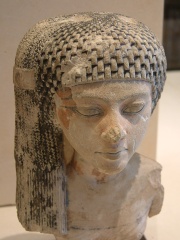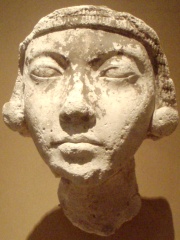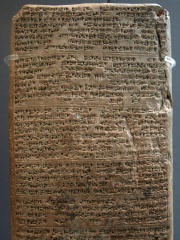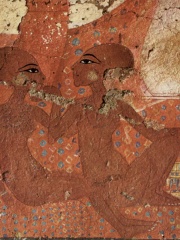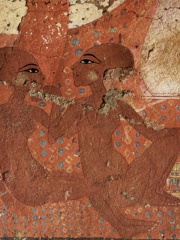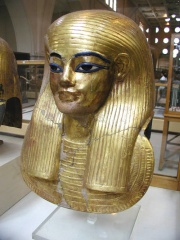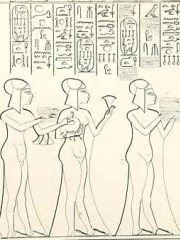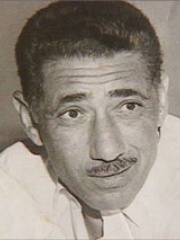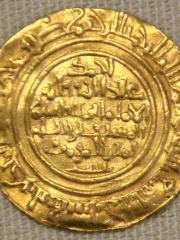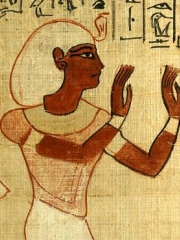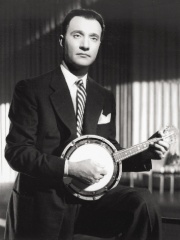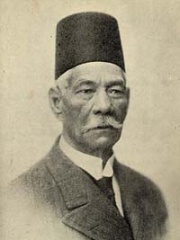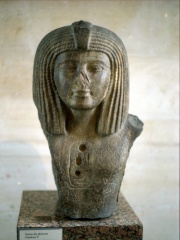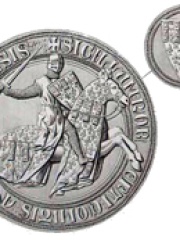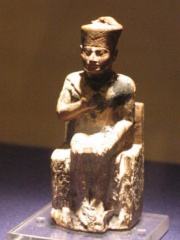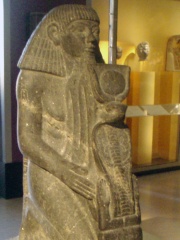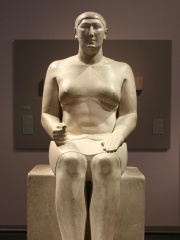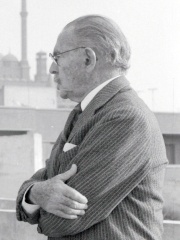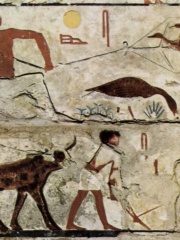ARCHITECT
Amenhotep, son of Hapu
1420 BC - 1400 BC
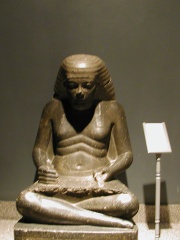
 Amenhotep, son of Hapu
Amenhotep, son of Hapu
Amenhotep, son of Hapu (transcribed jmn-ḥtp zꜣ ḥꜣp.w; fl. early-mid 14th century BC) was an ancient Egyptian architect, a priest, a herald, a scribe, and a public official, who held a number of offices under Amenhotep III of the 18th Dynasty. He was posthumously deified as a god of healing. Read more on Wikipedia
His biography is available in 29 different languages on Wikipedia (up from 28 in 2024). Amenhotep, son of Hapu is the 122nd most popular architect (down from 101st in 2024), the 233rd most popular biography from Egypt (down from 191st in 2019) and the 5th most popular Egyptian Architect.
Amenhotep, son of Hapu was the architect of the great sphinx, which is a statue of a lion with a human head.
Memorability Metrics
Page views of Amenhotep, son of Hapu by language
Among ARCHITECTS
Among architects, Amenhotep, son of Hapu ranks 122 out of 518. Before him are Auguste Perret, Carl Gotthard Langhans, César Pelli, Minoru Yamasaki, Peter Eisenman, and Hannes Meyer. After him are Eliel Saarinen, Balthasar Neumann, Inigo Jones, Filippo Juvarra, Francesco di Giorgio Martini, and James Stirling.
Most Popular Architects in Wikipedia
Go to all RankingsAuguste Perret
1874 - 1954
HPI: 66.56
Rank: 116
Carl Gotthard Langhans
1732 - 1808
HPI: 66.54
Rank: 117
César Pelli
1926 - 2019
HPI: 66.51
Rank: 118
Minoru Yamasaki
1912 - 1986
HPI: 66.50
Rank: 119
Peter Eisenman
1932 - Present
HPI: 66.42
Rank: 120
Hannes Meyer
1889 - 1954
HPI: 66.32
Rank: 121
Amenhotep, son of Hapu
1420 BC - 1400 BC
HPI: 66.24
Rank: 122
Eliel Saarinen
1873 - 1950
HPI: 66.10
Rank: 123
Balthasar Neumann
1687 - 1753
HPI: 66.05
Rank: 124
Inigo Jones
1573 - 1652
HPI: 65.98
Rank: 125
Filippo Juvarra
1678 - 1736
HPI: 65.90
Rank: 126
Francesco di Giorgio Martini
1439 - 1502
HPI: 65.88
Rank: 127
James Stirling
1926 - 1992
HPI: 65.85
Rank: 128
Contemporaries
Among people born in 1420 BC, Amenhotep, son of Hapu ranks 2. Before him is Thutmose IV. Among people deceased in 1400 BC, Amenhotep, son of Hapu ranks 8. Before him are Jethro, Ankhesenamun, Thutmose IV, Meritaten, Tudḫaliya I, and Kiya. After him are Tadukhipa, Neferneferure, Neferneferuaten Tasherit, Ḫattušili II, Yuya, and Setepenre.
Others Born in 1420 BC
Go to all RankingsThutmose IV
PHYSICIAN
1420 BC - 1400 BC
HPI: 73.84
Rank: 1
Amenhotep, son of Hapu
ARCHITECT
1420 BC - 1400 BC
HPI: 66.24
Rank: 2
Others Deceased in 1400 BC
Go to all RankingsJethro
RELIGIOUS FIGURE
1400 BC - 1400 BC
HPI: 77.68
Rank: 2
Ankhesenamun
COMPANION
1347 BC - 1400 BC
HPI: 77.52
Rank: 3
Thutmose IV
PHYSICIAN
1420 BC - 1400 BC
HPI: 73.84
Rank: 4
Meritaten
RELIGIOUS FIGURE
1400 BC - 1400 BC
HPI: 72.75
Rank: 5
Tudḫaliya I
POLITICIAN
1500 BC - 1400 BC
HPI: 68.68
Rank: 6
Kiya
POLITICIAN
1400 BC - 1400 BC
HPI: 67.46
Rank: 7
Amenhotep, son of Hapu
ARCHITECT
1420 BC - 1400 BC
HPI: 66.24
Rank: 8
Tadukhipa
POLITICIAN
1365 BC - 1400 BC
HPI: 65.70
Rank: 9
Neferneferure
POLITICIAN
1400 BC - 1400 BC
HPI: 65.31
Rank: 10
Neferneferuaten Tasherit
COMPANION
1400 BC - 1400 BC
HPI: 65.08
Rank: 11
Ḫattušili II
POLITICIAN
1350 BC - 1400 BC
HPI: 64.75
Rank: 12
Yuya
POLITICIAN
1500 BC - 1400 BC
HPI: 64.60
Rank: 13
Setepenre
POLITICIAN
1400 BC - 1400 BC
HPI: 64.07
Rank: 14
In Egypt
Among people born in Egypt, Amenhotep, son of Hapu ranks 233 out of 642. Before him are Abdel Hakim Amer (1919), Peter III of Alexandria (500), Ahmes (-1680), Al-Musta'li (1076), Peire de Montagut (1200), and Herihor (-1200). After him are Mohammed Abdel Wahab (1901), Sufi Abu Taleb (1925), Saad Zaghloul (1858), Ahmose (-1504), Osorkon I (-1000), and Robert II, Count of Artois (1250).
Others born in Egypt
Go to all RankingsAbdel Hakim Amer
POLITICIAN
1919 - 1967
HPI: 66.44
Rank: 227
Peter III of Alexandria
RELIGIOUS FIGURE
500 - 490
HPI: 66.37
Rank: 228
Ahmes
MATHEMATICIAN
1680 BC - 1620 BC
HPI: 66.35
Rank: 229
Al-Musta'li
POLITICIAN
1076 - 1101
HPI: 66.31
Rank: 230
Peire de Montagut
POLITICIAN
1200 - 1232
HPI: 66.30
Rank: 231
Herihor
POLITICIAN
1200 BC - 1081 BC
HPI: 66.28
Rank: 232
Amenhotep, son of Hapu
ARCHITECT
1420 BC - 1400 BC
HPI: 66.24
Rank: 233
Mohammed Abdel Wahab
SINGER
1901 - 1991
HPI: 66.18
Rank: 234
Sufi Abu Taleb
POLITICIAN
1925 - 2008
HPI: 66.17
Rank: 235
Saad Zaghloul
POLITICIAN
1858 - 1927
HPI: 66.16
Rank: 236
Ahmose
POLITICIAN
1504 BC - 1492 BC
HPI: 66.16
Rank: 237
Osorkon I
POLITICIAN
1000 BC - 889 BC
HPI: 66.12
Rank: 238
Robert II, Count of Artois
NOBLEMAN
1250 - 1302
HPI: 66.11
Rank: 239
Among ARCHITECTS In Egypt
Among architects born in Egypt, Amenhotep, son of Hapu ranks 5. Before him are Khufu (-2700), Imhotep (-2800), Senenmut (-1600), and Hemiunu (-2500). After him are Hassan Fathy (1900), and Nefermaat (-2500).
Khufu
2700 BC - 2570 BC
HPI: 86.57
Rank: 1
Imhotep
2800 BC - 2700 BC
HPI: 81.17
Rank: 2
Senenmut
1600 BC - 1463 BC
HPI: 68.57
Rank: 3
Hemiunu
2500 BC - 2501 BC
HPI: 67.31
Rank: 4
Amenhotep, son of Hapu
1420 BC - 1400 BC
HPI: 66.24
Rank: 5
Hassan Fathy
1900 - 1989
HPI: 64.09
Rank: 6
Nefermaat
2500 BC - Present
HPI: 62.87
Rank: 7
